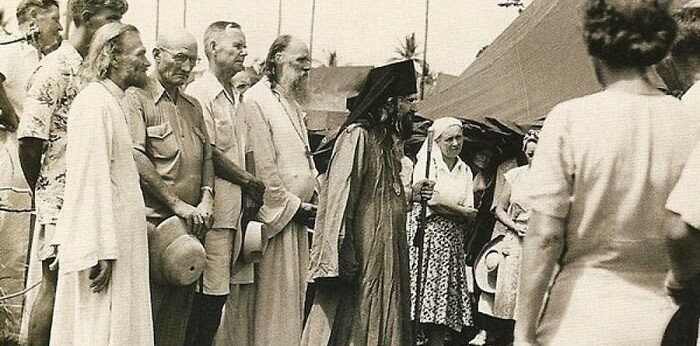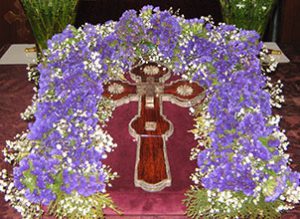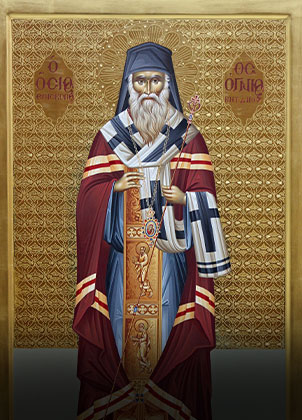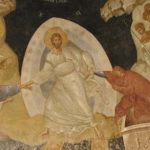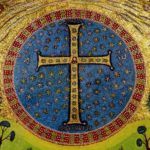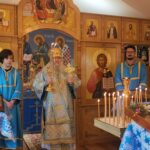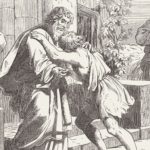GEORGE LARIN’S RECOLLECTIONS of SAINT ARCHBISHOP JOHN of SHANGHAI
Translated by his son Seraphim Larin
It’s with a grieving heart and indelible traces of love and profound respect in my mind and soul for Archbishop John (Maksimovich) that I commence my remembrance of him. If all the many facetted activities were to be to be assembled in detail of this righteous man, we would see a majestic portrait that would stun us in astonishment in its presentation; however, this would require a great deal of time, and that’s why I have confined myself to those moments that have left a bright mark in my mind and consciousness.
Archbishop John arrived in Shanghai (China) from Serbia in 1935. At the time, I was the Treasurer of the Parish Council of the Holy Mother of God Cathedral and as a consequence, was in constant contact with him, which allowed me to observe his activities – both in Shanghai and then in the Philippines.
Vladika was ascetic. The underpinning foundation of this deed was constant prayer and fasting. He didn’t allow even vegetable oil to be applied in his food, while during Christmas and Easter Lents, all that he consumed were prosphoras (blessed bread). Vladika didn’t recognise rest and never slept in a bed. As a rule, he spent nights on his knees praying, and when this deed exhausted him, he would rest his head on the floor and take a short nap.
He performed day and night Church Services daily, even when he was ill. Irrespective where he was, he never missed carrying out his Church Services. Once, when his leg was severely swollen, which the doctors regarded may lead to gangrene and wanted to hospitalise him in order to treat it, Vladika categorically refused to comply. The Russian doctors then advised the Parish Council that they are removing all responsibility for Vladika’s health and indeed – his life. After the insistent demand from the members of the Council – threatening a forcible hospitalisation, Vladika agreed and checked into the Russian hospital in the morning of the eve of one of the 12 major Feast Days. However, shortly before 6 pm that day, he left the hospital and walked to the Cathedral with a heavy limp. Despite pleads to return to the hospital, Vladika refused, and within 24 hours the swelling disappeared.
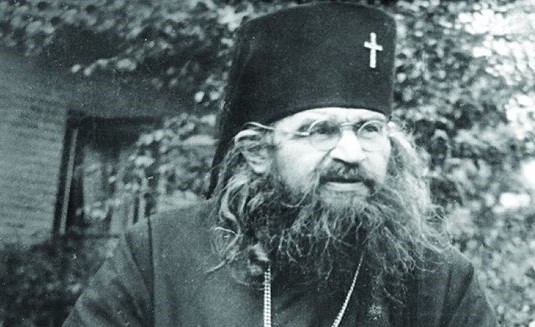
He was totally oblivious to personal interests but had an indefatigable care for the needy and children. Noticing that Vladika lacked warm winter clothing, some parishioners furnished him with woollen attire: only to find to their displeasure, the same clothing being worn by the beggars that frequented the outside yard of the Cathedral.
He never visited a house for a cup of tea but made his unannounced appearances in households where there was a great need, sickness or impending death. Despite the heat, cold or rain – day and night – Vladika would visit the Russian hospital and orphanage, blessing the ill and children with the cross. He visited the prisons where Russian prisoners were incarcerated and at Easter, gave them coloured eggs and Easter cake (kulichi), as well as praying with them and for them.
Vladika wore clothing made from cheap Chinese material and soft – without socks, Chinese shoes – winter and summer. Initially, some critics called him “fool for Christ” and criticised him for his lengthy Church Services, but subsequently changed their opinions.
In Shanghai, many Russian families lacked material needs and were unable to send their children to school. Vladika established an orphanage in the name of Saint Tikhon of Zadonsk to provide a roof, food and educational facilities for orphans and children of economically disadvantaged parents. The orphanage accommodated up to 100 boys and girls who were tutored up to the intermediate level of Imperial standard. He personally tutored his nurselings in Catechism and tirelessly watched their spiritual development. He loved children, and they in turn responded with their love. Often, in the evening, you would find him surrounded by children in his quarters – his face lit with a shining smile on his face. These occasions left their deep mark on these young souls, and when they reached adulthood – including my two sons who served him in the Cathedral as altar boys – recalled these instances with great heart warming fondness.
He continued to advance his spiritually paternal care for the Saint Olga orphanage and charity house for the elderly. While he was an honoured president of a number of organisations, he took an active part at their general meetings and like his call from the pulpit, urged the members to donate toward the needy. Vladika always championed Russian interests resolutely and enjoyed great prestige and respect from the authorities in Shanghai, and later when he arrived in the Philippines – on an island called Tubabao. I was a witness on a number of occasions when ordinary natives came up to him for a blessing.
Vladika John was well-versed in the ancient Jewish language as well as being fluent in Greek and French. On Greek feast-days, he served Liturgy in the Cathedral in the Greek language where all the staff from the Greek Embassy was present, including the Consul-General and ordinary Greek faithful.
Vladika was held in very high esteem and was loved by the adults. This showed that those who felt the sinful weight on their souls, or when they felt their strength slipping in their daily battles with sin, they turned to him for help: he would say a prayer on their behalf and relieve them of their stress. He was a beacon to us upon which our spiritual eyes turned to during burdened days of earthly trials and tribulations. He illuminated our lives with the light of his spiritual deeds: he gave warmth to everyone that came to him with their sorrows. I experienced this myself. He tirelessly called us to deeds of faith, prayer, hope and love, as well as fidelity to our Russian Orthodox Church Abroad.
When Vladika arrived in Shanghai, the church belonged to the Military Union that had left the jurisdiction of the Peking Spiritual Mission. His first undertaking was to establish peace among the community, which he achieved in a very short time.
Bishop John’s next pressing problem was to safeguard the Russian children that attended Catholic schools from joining the Catholic Faith, and especially those studying at a Uniate school, specifically established for Russian children. It was an uneven struggle as the Catholics had material means and opportunities at their disposal: they offered many incentives to the children and secured jobs for their parents. These schools forced the students to learn their Catechism and attend daily Church services, instilling that the only true Faith is Catholicism.

Vladika, with his inherent energy, commenced his battle against this situation: and what did he do? He began by visiting these schools during class hours. Church authorities felt awkward to deny entry to Vladika and watched helplessly as he handed out Orthodox crosses to the pupils to wear around their necks, as well as giving them copies of the Gospel and recording their names and their addresses. He would later visit their parents at these addresses: note their attendance on Sunday Services and invite them to his cell where he conversed with them.
Vladika was endowed with great fortitude. During the Japanese occupation, the Japanese authorities tried to totally subjugate the Russian colony. This was done through pressure on the president of the Russian Migrant Committee. Two presidents that insisted on independence and refused to support them resulted in them being executed.
The alarmed Russian colony was in consternation. Many were in fear. At this moment, despite the warnings from some Russians that collaborated with the Japanese, Vladika announced that he was the temporary head of the Russian colony, forcing the authorities to cease their pursuit.
In response, while not touching Vladika, the Japanese military took 200 Russians and sent to work in the provinces, and all perished. Vladika immediately decided to serve Panihida for them (Service for the departed). Despite warnings from those Russians that were in Japanese employ that this could end very badly for Vladika, he performed the Service attended by the weeping widows and their children.
During the Japanese occupation, the city of Shanghai experienced enforced blackouts for fear of bombing runs by the Americans. The streets were shrouded and the city was in impenetrable darkness. Usually, such nights produced political assassinations, robberies and bashings so that very few people ventured out into the night. Besides these possible misfortunes, the individual could run into a Japanese patrol as these were curfew hours. However, Vladika walked the streets fearlessly, and there wasn’t one instance when he was disturbed by any unpleasant situation. The Lord preserved him.
Many cases can be brought which showed the benignant power of Vladika’s prayers, but I will relate only those which I witnessed personally. The wife of Vladika’s secretary – Mrs. Kantova had incurable cancer, and was given 3 weeks to live by the doctors. However, due to Vladika’s ardent prayers, she went on to live a long life.
My friend Cossack Orlov suffered from alcoholism and in realising this went to various doctors for treatment, which proved ineffective. He then turned to Vladika for help. Vladika went down on his knees with my friend, and prayed fervently for a considerable time. When they both stood up, Orlov was a normal human being without the destructive drive.
The third event happened on the island of Tubabao, where Russians from Shanghai, Tsingdao and Tientsin were temporarily billeted in tents.
Being the head of the Church section where the church was situated as well as quarters for priests, nuns and Vladika, I occasionally accompanied Vladika on his travel to the town of Guan, where he visited seriously ill Russians in a Philippine hospital. He would distribute among them pocket sized Gospels and small icons.
On one of these visits, upon entering the Russian section of the hospital, we were greeted with agonising groans and cries from one of the patients. Our inquiry as to the woman’s ailment, we were told by the nurse that as she had a terminal illness and her cries disturbed the rest of the patients, she was placed in an outside wing of the hospital. Upon hearing this, Vladika decided to visit her immediately. To the nurses objection to such a visit – she cautioned that the poor woman exuded a foul odour – Vladika replied “That doesn’t mean anything”, and with hurried steps headed for the woman’s room. I followed. Upon entering, the room indeed was filled with the vile smell. Coming up to the suffering woman, he placed a cross on her forehead and began praying. I retreated. After a lengthy prayer, Vladika took confession from her and gave her Holy Communion.
When we finished our hospital visit and were leaving, the woman’s cries ceased and were replaced with soft moans. Later, at one of Vladika’s regular visits to the hospital, as we arrived and stepped out of the Jeep, a woman came running up to us and threw herself at Vladika’s feet… it was the patient with a “terminal” illness that he prayed for.
On the way to hospital, we had to pass a cemetery where a number of Russians were buried. Vladika never failed to stop and say a prayer over the graves and upon departing, make the sign of the Cross over the cemetery.
This is what Bishop Savva of Edmonton said during the requiem mass for Vladika John: “I would have not been able to live like that for 2 weeks: would not have been able to endure those onerous burdens that had befallen him”. A bitter truth rings out from these uttered words. It was very distressing for him to be among those that defamed and slandered him in the city of San Francisco. They ignored his wise utterances, so he left them and went to God Who sent him to the world to sow the spiritual: sow righteousness. He left us sinners among earthly disturbances: in the middle of an earthly torturous sea. This great and holy man of the Overseas Russian Church died from a heart-attack on the 2 of July 1966 at 3.50pm, in the city of Seattle while travelling throughout his Diocese with the Holy Miracle-working Icon of Mother of God. At his funeral, the San Francisco Cathedral overflowed with so many mourners that they filled the surrounding pavements and roads, forcing the police to close the immediate vicinity of the Cathedral.
Among those present were a number of clergy of the Catholic Church. In entering the Cathedral one of them explained: “We came to pray for your holy person”. Like all the others, they stood with lit candles and immersed in prayer.
Despite the intensely hot weather, Vladika’s open coffin stood for 6 days without showing any signs of decomposition.
Heavenly Kingdom to him and eternal repose.
GEORGE LARIN

